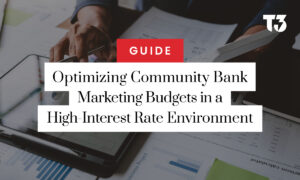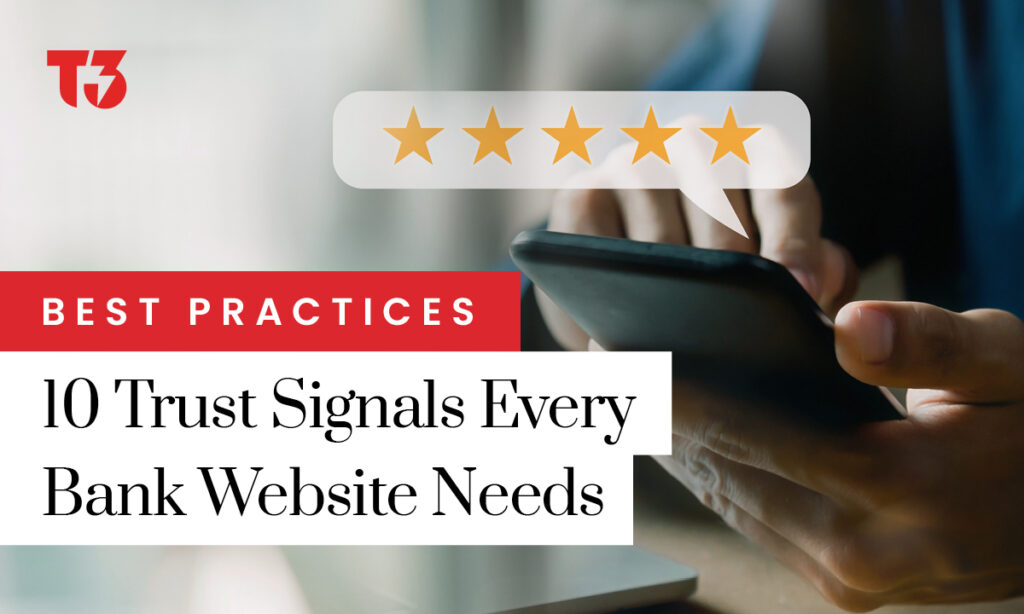

Trust Signals support your brand, but more importantly, can have an impact on your bottom line. Let’s look over what they are and figure out if you are covering all the bases on your website.
Trust signals are the visual and functional elements on your website that build credibility and confidence. They assure visitors that your institution is legitimate, secure, and worthy of their business. They are the digital equivalent of a friendly greeter, a clean lobby, and a professional staff—subtle yet powerful indicators that you can be trusted.
For financial services, trust isn’t just a nice-to-have—it’s the foundation of every relationship. Whether you’re trying to increase deposit accounts, boost loan applications, or encourage mobile banking adoption, people need to feel secure before they engage.
Your website is often the first and most critical touchpoint in building that trust. It needs to communicate:
“We’re legitimate.”
“We’re secure.”
“We’re local and accessible.”
“We’re human.”
We handle everything from strategy to creative to deployment
Smart data and list-building to engage the right customers
Campaigns that align with your brand and speak to your audience
1. FDIC or NCUA Insurance Badge
Make sure your website proudly displays your federal insurance status. While most banks and credit unions do this, they often bury it in the footer. Bring it up to the homepage, ideally in a prominent header or a sidebar.
2. Secure Site (SSL Certificate / HTTPS)
A missing padlock icon in the browser is an instant red flag. All web pages, not just login forms, should be encrypted and secure. A valid SSL certificate ensures that all data transmitted between the user’s browser and your server is private.
3. Clear Contact Info and Physical Location
A real phone number. A real address. A map to your branches. If visitors can’t easily reach you, they won’t trust you. Consider adding a “Contact Us” section in your main navigation and a click-to-call phone number for mobile users.
4. Team or Executive Bios
People trust people—not just logos. Featuring leadership, branch managers, or customer service staff (with photos) adds a local, personal touch that large banks can’t replicate. This humanizes your institution and reinforces your community focus.
5. Up-to-Date Content
Your homepage shouldn’t promote last summer’s auto loan special. An updated blog, current rates, and timely community updates signal that someone is at the helm and paying attention. This also shows that you are a reliable and active institution.
6. Testimonials and Member Quotes
Even one or two simple quotes from happy members builds trust.
“We’ve been members since 2004 and wouldn’t bank anywhere else.”
That’s more persuasive than paragraphs of marketing fluff. Consider using short video testimonials or linking to your Google and Yelp reviews for social proof.
7. Privacy Policies and Disclosures
Include them in the footer—but make sure they’re easy to read and clearly labeled. It’s not just a legal requirement—it’s a trust signal. A well-organized and transparent disclosure page builds confidence and shows you respect user data.
8. Clean, Consistent Branding
Trust isn’t just about security—it’s about polish. Poor design, outdated logos, or inconsistent colors can make even the safest institution feel sketchy. A professional and modern website design signals reliability and competence.
9. Secure Login Portal
Your login button should say “Secure Sign-In” or display a lock icon. If your online banking login page looks outdated or unsecure, customers will hesitate—or worse, abandon it altogether. Ensure the login process is straightforward and clearly communicates its security features, such as multi-factor authentication.
10. Social Proof and Community Involvement
Sponsoring the local high school football team? Hosting a financial literacy seminar? Don’t keep that quiet. Community involvement builds pride and familiarity. Highlight these activities on a dedicated “Community” or “In the News” page and share photos from events.
Your website should feel like your best branch—inviting, helpful, and trustworthy.
If it’s missing basic trust signals, you’re leaving money (and potential relationships) on the table.
We offer a free web audit for small banks and credit unions. In less than a day, you’ll get a report on your trust signals, mobile performance, ADA compliance, and more—no strings attached.
T3 by Current Marketing is a turnkey marketing solution built specifically for financial professionals and institutions.

Need expert marketing help now?
Get a Power Hour session for branding, processes, data, strategy, tech setup, and more! Click to learn how we can optimize your business.